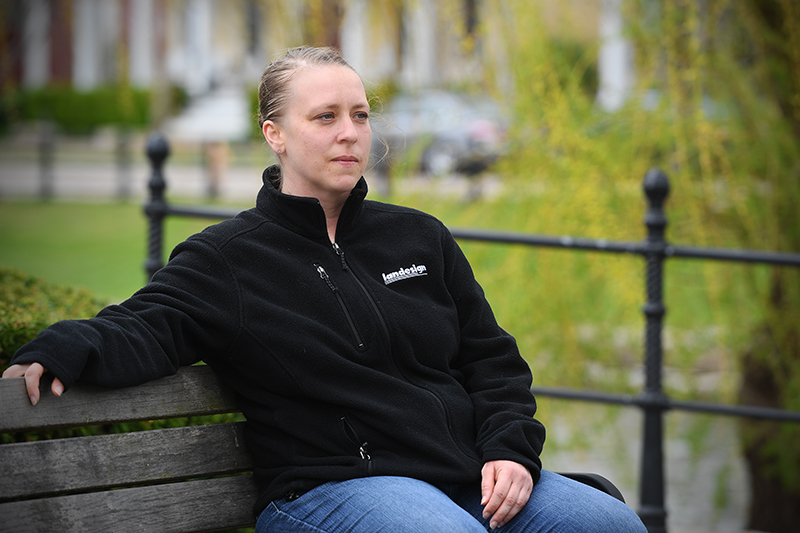
Serve the nation, see the world, learn valuable skills.
Life in the Army seemed to offer so much promise to Angela Peacock, especially compared to her daily grind of waiting tables and taking classes.
“I was trapped in my own version of ‘Groundhog Day’ — go to school, go to work, go to bed,” recalled Peacock, who grew up in Ferguson, Mo. “It had no meaning.”
So, in 1998, Peacock enlisted in the Army. When 9/11 happened, she was ready.
“I believed in the mission,” Peacock said. “We were told: ‘You are going to go free people.’ That’s literally what many people thought. ‘We are going to save these people from Saddam.’”
Peacock can’t remember when her feelings about the war changed. Maybe it was when her convoy took fire as it rolled into Baghdad. Or when she learned that sectarians planted bombs inside the carcasses of dogs. Or when she shoved away a young Iraqi girl selling cigarettes.
“I didn’t know if what she really had were explosives,” Peacock said. “You never knew who wanted you dead.”
Peacock had trained for the constant attacks and the conditions (her camp had no toilets, no showers). But when Peacock found herself, down to 100 pounds, suffering a panic attack under a humvee, she knew something was wrong. She was flown to Germany and medically retired.
That wasn’t the end of Peacock’s problems, though; it was the beginning. Back in St. Louis, she continued to suffer panic attacks and a host of medical problems. Soon, she developed an addiction to the painkillers she was prescribed.
“Their answer was to put me on medicine and get me out of the Army,” Peacock said. “What they should have said is, ‘You are having a normal reaction to an abnormal situation. Of course, you are having a hard time adjusting. It’s OK.’”
Peacock more than doubled her weight and only left her home once a week for groceries. At the urging of her grandmother, Peacock finally sought help. She enrolled in a string of programs; each one nudging her a little further down the road to recovery. Still, she felt the only people in her life were doctors and therapists. She joined a horse therapy program where she learned to walk like a survivor, not a victim.
“When you are beat down and you have no relationships, you forget how to interact with human beings,” Peacock said. “Horse therapy taught me how to be assertive, how to be strong.”
That’s also when she met G.I. Joe, a black lab service dog. With G.I. Joe by her side, Peacock did what had been unimaginable just a few weeks before — run errands. She remembers vividly the day she went to the grocery store and the bank on one trip. Her next goal: return to school. Her Veterans Affairs therapist advised her to ease into St. Charles Community College with a single class, but Peacock was ready to get her life back on track. They compromised on two classes: English composition and ceramics. Peacock aced them both.
With every A, Peacock got more confident. Still, she felt isolated. On her way to and from the parking lot, she would notice Marine bumper stickers or Iraq veteran license plates. Who were these people? She started the school’s first veteran organization to find out.
“Eighty people showed up at that first meeting,” Peacock said. “It was amazing. It was like, ‘Here are my people.’”
Then, as a psychology student in Arts & Sciences at Washington University in St. Louis, Peacock found her people at WUVets, which serves undergraduate and graduate student veterans as well as other students who are interested in veteran issues. As a leader of WUVets, she has helped organize events, build the group’s digital presence and advocate for more veteran resources across campus. She successfully petitioned the university to recognize student veterans during Commencement and to include the red, white and blue honor cord as part of the official regalia for graduating veterans.
“Just a small act goes a long way,” said Peacock, who has been selected to serve as the University College student marshal at Commencement, an honor reserved for top student leaders.
Peacock also will be inducted into Phi Beta Kappa, the nation’s oldest and most prestigious liberal arts honorary, and she has received a large scholarship to continue her Washington University education at the Brown School. She plans to study veteran issues.
Peacock no longer needs G.I. Joe constantly by her side, but she will continue to seek out the camaraderie of other student veterans.
“With anybody else, it takes months of getting to know each other,” Peacock said. “With veterans, just put us together and the magic happens.”